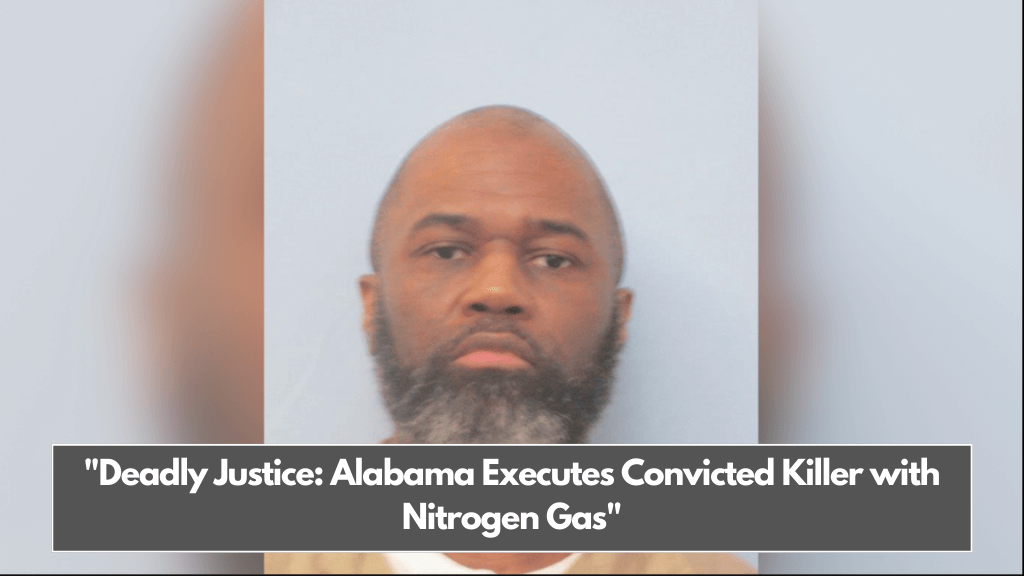On Thursday, Alabama carried out the execution of Demetrius Frazier, 52, marking the fourth U.S. execution using nitrogen gas. Frazier was convicted of raping and murdering 41-year-old Pauline Brown in 1991 after breaking into her apartment in Birmingham. His death represents Alabama’s first execution in 2025 and the third in the U.S. this year.
The Crime and Conviction
On November 27, 1991, Frazier, then 19, entered Brown’s apartment while she was asleep. Prosecutors said Frazier demanded money, took $80 from her purse, and raped her at gunpoint. Afterward, he shot her in the head. Investigators revealed that Frazier returned to the apartment later to search for more money and eat a snack.
Frazier’s criminal past also included the 1992 murder of 14-year-old Crystal Kendrick in Michigan, for which he was sentenced to life in prison. While serving that sentence, he confessed to the murder of Pauline Brown, leading to his trial and conviction in Alabama in 1996.
The jury recommended the death penalty by a vote of 10-2. He remained in Michigan custody until 2011, when Michigan officials, under then-Governor Rick Snyder, agreed to transfer him to Alabama’s death row.
Controversy Over Frazier’s Transfer to Alabama
Frazier’s mother and death penalty opponents had pleaded with Michigan Gov. Gretchen Whitmer to intervene and return him to Michigan, a state that does not allow the death penalty.
However, Whitmer stated that her predecessor had already approved the transfer, leaving the decision in Alabama’s hands. The Michigan attorney general’s office opposed the request, and Frazier’s execution proceeded as planned.
“It’s a really tough situation,” Whitmer told The Detroit News, acknowledging the appeals but emphasizing Michigan’s lack of jurisdiction.
Execution Using Nitrogen Gas
Frazier was put to death using nitrogen gas, a relatively new method that Alabama first adopted in 2024. The procedure involves replacing breathable air with pure nitrogen gas, leading to death by oxygen deprivation.
The execution began at 6:10 p.m. CST, with a corrections officer conducting a final check of the respirator mask. Witnesses observed Frazier making swirling motions with his hands, grimacing, and lifting his legs briefly before his breathing became irregular.
By 6:21 p.m., he was no longer visibly moving. Alabama Corrections Commissioner John Hamm confirmed that Frazier had no heartbeat 13 minutes after the gas began flowing.
Hamm stated that the initial movements were likely involuntary, adding that Frazier appeared to lose consciousness quickly. Media witnesses described similar initial reactions during previous nitrogen gas executions, sparking criticism from death penalty opponents who argue that the method may cause distress or prolonged suffering.
Legal Challenges to the Execution Method
Frazier’s attorneys had sought to block the execution, arguing that nitrogen gas did not cause death as quickly or painlessly as Alabama had promised. A federal judge rejected the request, ruling that the evidence did not demonstrate severe or excessive pain beyond what is typically associated with any execution.
Critics point out that witnesses have reported shaking and other physical reactions during previous nitrogen gas executions. However, the court maintained that such reactions are not sufficient to deem the method unconstitutional.
Family and State Reactions
Some of Pauline Brown’s family members attended the execution but chose not to speak to the media afterward. Alabama Gov. Kay Ivey issued a statement emphasizing the importance of enforcing the law and delivering justice for crime victims.
“In Alabama, we enforce the law. You don’t come to our state and mess with our citizens and get away with it. Rapists and murderers are not welcome on our streets, and tonight, justice was carried out for Pauline Brown and her loved ones,” Ivey said.
The execution of Demetrius Frazier highlights ongoing debates over the use of nitrogen gas as a method of execution and the legal complexities surrounding death penalty cases.
With Frazier’s execution, Alabama continues its commitment to enforcing capital punishment while facing scrutiny over the potential suffering associated with this method.
As the state leads the nation in adopting nitrogen gas for executions, its effectiveness and ethical implications are likely to remain under discussion.
